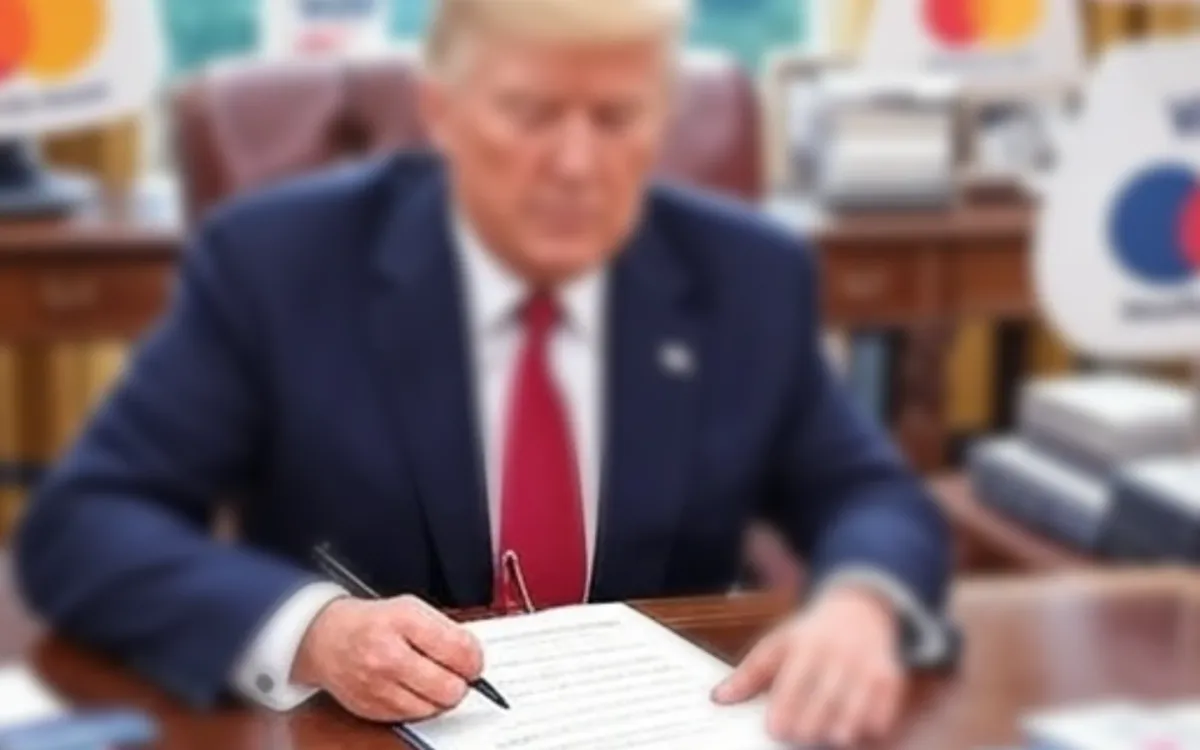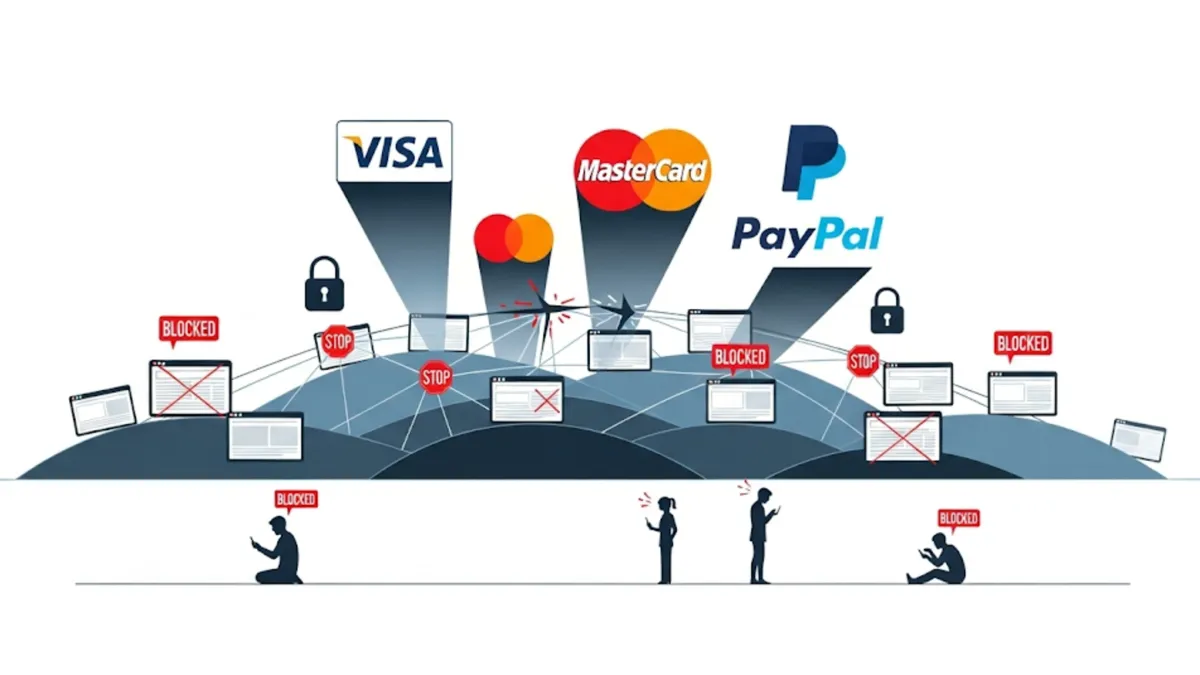
President Donald Trump signed an executive order on August 7, 2025, targeting what he characterized as discriminatory banking practices, drawing support from merchants who have long criticized the financial industry's treatment of small businesses and emerging payment technologies. The order specifically addresses concerns about banks restricting services based on political or religious beliefs while highlighting broader issues within the payment processing ecosystem.
According to the executive order, "Financial institutions have engaged in unacceptable practices to restrict access to financial services on the basis of political or religious beliefs or lawful business practices." The measure establishes a 180-day timeline for federal banking regulators to eliminate reputation risk considerations that could lead to discriminatory account closures or service restrictions.
Subscribe the PPC Land newsletter ✉️ for similar stories like this one. Receive the news every day in your inbox. Free of ads. 10 USD per year.
The Merchants Payments Coalition welcomed the announcement, with member Doug Kantor from the National Association of Convenience Stores stating that "Big banks and credit card companies not only discriminate against conservatives, they mistreat new financial technology companies, cryptocurrency businesses and Main Street businesses." Kantor emphasized how these practices inflate prices while preventing innovation, particularly harming small businesses and consumers who can least afford the impact.
Payment Network Market Concentration
The executive order arrives amid ongoing concerns about payment network concentration. According to the Merchants Payments Coalition, Visa and Mastercard control 80% of the market while blocking competition from smaller networks including NYCE, Star and Shazam. This concentration has enabled significant fee increases, with credit card swipe fees more than quadrupling since 2010 to reach $111.2 billion last year alone.
Total credit and debit card swipe fees hit a record $187.2 billion in 2024, making these charges the highest operating cost for most merchants after labor expenses. The coalition estimates these fees drive up prices by nearly $1,200 annually for the average American family.
The regulatory framework outlined in Trump's order requires the Small Business Administration to identify and contact businesses that were previously denied services through discriminatory practices. Financial institutions have 120 days to restore access to qualifying clients who were affected by what the order terms "politicized or unlawful debanking."
Congressional Support and Industry Response
The banking order coincides with congressional consideration of the Credit Card Competition Act, which received cosponsorship from Vice President JD Vance during his Senate tenure. Current supporters include Senator Roger Marshall of Kansas and Representative Lance Gooden of Texas, among other conservative lawmakers.
Under the proposed legislation, banks with at least $100 billion in assets would enable credit card processing through unaffiliated networks beyond Visa and Mastercard. According to industry projections, this competition could save merchants and consumers $17 billion annually while improving security measures and maintaining existing reward programs.
The executive order establishes specific definitions for prohibited practices. "Politicized or unlawful debanking" encompasses any action by financial service providers to restrict access or modify account conditions based on customers' political beliefs, religious views, or lawful business activities that institutions oppose for political reasons.
 PPC LandLuis Rijo
PPC LandLuis Rijo
Technology Sector Implications
Financial technology companies have experienced particular scrutiny from traditional banking institutions. According to Financial Technology Association CEO Penny Lee, JPMorgan Chase's recent decision to charge for consumer bank data access "is designed to crush competition, hold back American innovation, and lock consumers into bank-only products."
This development contradicts a Consumer Financial Protection Bureau rule requiring free data access, which banks have challenged through litigation. The regulatory conflict highlights tensions between established financial institutions and emerging payment alternatives that could potentially reduce swipe fee burdens if permitted to expand market presence.
The order addresses historical precedents including Operation Chokepoint, which the document describes as "a well-documented and systemic means by which Federal regulators pushed banks to minimize their involvement with individuals and companies engaged in lawful activities and industries disfavored by regulators." The administration characterizes such programs as weaponizing regulatory authority for political purposes.
Digital Advertising Context
For the marketing community, these financial service regulations carry particular significance as payment processing challenges affect advertising technology platforms. The digital advertising ecosystem relies heavily on streamlined financial transactions for campaign funding, publisher payments, and automated billing systems.
Recent developments in the advertising technology sector have shown how regulatory frameworks can dramatically reshape industry practices. As financial institutions face increased scrutiny over discriminatory practices, advertising platforms may need to evaluate their own payment processing partnerships and ensure compliance with emerging anti-discrimination requirements.
The intersection of financial services and digital marketing becomes increasingly complex as artificial intelligence transforms advertising operations. Payment processing reliability remains crucial for automated advertising systems that require seamless transaction capabilities across multiple platforms and service providers.
Implementation Timeline
Federal banking regulators have 180 days to review and remove guidance that could enable discriminatory practices. The Treasury Secretary must develop a comprehensive strategy within the same timeframe for additional measures to combat banking discrimination across the federal government.
The order requires financial institutions to conduct internal reviews identifying past discriminatory policies and take appropriate remedial action. Banks found violating applicable laws face potential fines, consent decrees, and other disciplinary measures under existing consumer protection statutes.
Banking regulators must also examine current supervisory data to identify institutions that have engaged in religious discrimination specifically. Cases where institutions cannot achieve compliance may be referred to the Attorney General for civil enforcement action.
The executive order emphasizes that banking decisions should be made through "individualized, objective, and risk-based analyses" rather than broad categorical restrictions. This principle aligns with merchant advocacy for competitive payment processing that benefits both businesses and consumers through reduced costs and improved services.
According to the document, individuals and businesses affected by discriminatory banking practices have experienced "frozen payrolls, debt and crushing interest, and other significant harms to their livelihoods, reputations, and financial well-being." The order positions such practices as incompatible with free society principles and the objective risk-based standards that should govern financial service provision.
The regulatory changes may affect how financial institutions evaluate cryptocurrency businesses, fintech companies, and other innovative payment service providers that have faced challenges accessing traditional banking services. The order specifically prohibits discrimination against lawful business activities that institutions oppose for political rather than risk-based reasons.
Timeline
- August 7, 2025 - President Trump signs executive order "Guaranteeing Fair Banking for All Americans"
- August 8, 2025 - Merchants Payments Coalition issues statement supporting the action
- October 7, 2025 (60 days) - SBA must notify financial institutions of new requirements
- December 5, 2025 (120 days) - Banks must identify and contact affected clients for service restoration
- February 3, 2026 (180 days) - Federal banking regulators must complete guidance review and strategy development
Subscribe the PPC Land newsletter ✉️ for similar stories like this one. Receive the news every day in your inbox. Free of ads. 10 USD per year.
Key Terms Explained
Banking discrimination represents the practice of financial institutions restricting access to services based on non-risk factors such as political beliefs, religious views, or lawful business activities. The executive order defines this as actions that adversely restrict account access or modify service conditions for reasons unrelated to objective financial risk assessment. This practice has affected individuals and businesses across various sectors, leading to frozen accounts and restricted access to essential financial services.
Swipe fees constitute the charges merchants pay to process credit and debit card transactions, representing their highest operating cost after labor expenses. These fees have more than quadrupled since 2010, reaching $111.2 billion for credit cards alone in 2024. The Merchants Payments Coalition emphasizes how these costs ultimately increase consumer prices by nearly $1,200 annually for average American families, making fee reduction a priority for retail advocacy groups.
Payment networks refer to the infrastructure systems that process electronic transactions between merchants, banks, and consumers. Visa and Mastercard control 80% of this market, enabling them to set pricing and restrict competition from smaller networks like NYCE, Star, and Shazam. The concentrated control allows these dominant networks to implement central price-fixing mechanisms that limit competitive alternatives for transaction processing.
Financial institutions encompass banks, savings associations, credit unions, and other providers of financial services that fall under federal regulatory jurisdiction. The executive order specifically targets these entities' discriminatory practices while requiring compliance with new anti-discrimination guidelines. These institutions must now demonstrate objective, risk-based decision-making rather than using political or religious considerations in service provision.
Federal banking regulators include agencies such as the Small Business Administration and Federal member agencies of the Financial Stability Oversight Council with supervisory authority over financial institutions. These regulators have 180 days to eliminate guidance that could enable discriminatory practices and must develop comprehensive strategies to combat banking discrimination across government operations.
Credit Card Competition Act represents proposed legislation cosponsored by Vice President JD Vance during his Senate tenure, requiring large banks to enable processing through unaffiliated networks beyond Visa and Mastercard. The measure aims to introduce competition that could save merchants and consumers $17 billion annually while maintaining existing reward programs and improving security standards through competitive pressure.
Fintech companies describe financial technology firms that offer innovative payment alternatives and digital financial services, often facing discrimination from traditional banking institutions. JPMorgan Chase's decision to charge for consumer bank data access exemplifies how established banks attempt to restrict fintech growth, despite Consumer Financial Protection Bureau rules requiring free data provision for competitive innovation.
Executive order constitutes the legal instrument President Trump used to direct federal agencies to combat banking discrimination, establishing specific timelines and requirements for implementation. The order carries the full authority of presidential directive, requiring federal banking regulators to review existing guidance and eliminate practices that could enable discriminatory service restrictions based on political or religious factors.
Merchants Payments Coalition represents retailers, supermarkets, convenience stores, and other businesses advocating for competitive and transparent payment systems. The coalition has consistently highlighted how payment network concentration inflates costs for merchants and consumers while stifling innovation in payment processing technology, making them strong supporters of regulatory action against discriminatory banking practices.
Operation Chokepoint describes a documented regulatory program where federal agencies pushed banks to minimize involvement with lawful businesses and industries disfavored by regulators for political rather than risk-based reasons. The executive order specifically references this program as an example of inappropriate regulatory overreach that weaponized banking oversight for political purposes, establishing precedent for the current anti-discrimination measures.
Subscribe the PPC Land newsletter ✉️ for similar stories like this one. Receive the news every day in your inbox. Free of ads. 10 USD per year.
Summary
Who: President Donald Trump signed the executive order, with support from the Merchants Payments Coalition and various congressional members including Senator Roger Marshall and Representative Lance Gooden.
What: An executive order targeting discriminatory banking practices, particularly focusing on restrictions based on political or religious beliefs, while addressing broader payment network concentration issues.
When: The executive order was signed August 7, 2025, with implementation requirements ranging from 60 to 180 days.
Where: The order affects all financial institutions operating under federal banking regulator jurisdiction across the United States.
Why: To eliminate what the administration characterizes as politically motivated banking discrimination while addressing merchant concerns about payment network dominance that increases costs for businesses and consumers.

